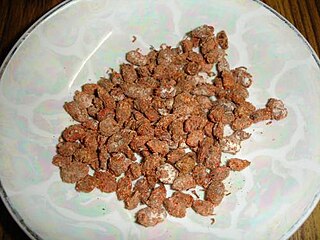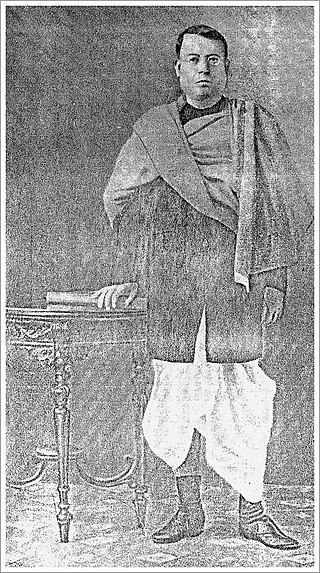Related Research Articles

Ayurveda is an alternative medicine system with historical roots in the Indian subcontinent. It is heavily practiced in India and Nepal, where around 80% of the population report using ayurveda. The theory and practice of ayurveda is pseudoscientific.
Maharishi Vedic Approach to Health (MVAH) is a form of alternative medicine founded in the mid-1980s by Maharishi Mahesh Yogi, who developed the Transcendental Meditation technique (TM). Distinct from traditional ayurveda, it emphasizes the role of consciousness, and gives importance to positive emotions. Maharishi Ayur-Veda has been variously characterized as emerging from, and consistently reflecting, the Advaita Vedanta school of Hindu philosophy, representing the entirety of the ayurvedic tradition.

Allopathic medicine, or allopathy, is an archaic and derogatory label originally used by 19th-century homeopaths to describe heroic medicine, the precursor of modern evidence-based medicine. There are regional variations in usage of the term. In the United States, the term is sometimes used to contrast with osteopathic medicine, especially in the field of medical education. In India, the term is used to distinguish conventional modern medicine from Siddha medicine, Ayurveda, homeopathy, Unani and other alternative and traditional medicine traditions, especially when comparing treatments and drugs.

Unani or Yunani medicine is Perso-Arabic traditional medicine as practiced in Muslim culture in South Asia and modern day Central Asia. Unani medicine is pseudoscientific. The Indian Medical Association describes Unani practitioners who claim to practice medicine as quacks.

Siddha medicine is a form of traditional medicine originating in southern India. It is one of the oldest systems of medicine in India.
The Ministry of Ayush, a ministry of the Government of India, is responsible for developing education, research and propagation of traditional medicine and alternative medicine systems in India. Ayush is a name devised from the names of the alternative healthcare systems covered by the ministry: ayurveda, yoga & naturopathy, Unani, Siddha, Sowa Rigpa, and homeopathy.

Jamini Bhushan Ray was an Indian physician, as well as an Ayurvedic doctor (Kabiraj), an erudite Sanskrit scholar, and a philanthropist.
Bhushan Patwardhan is a Distinguished Professor of Health Sciences, biomedical scientist, and ethnopharmacologist. He serves as the chairman of the Interdisciplinary AYUSH R&D Task Force on COVID-19 and India Lead, WHO Global Centre for Traditional Medicine Task Force. He is also a member of the Lancet Citizens' Commission on Reimagining India’s Health System. Until March 4, 2021, Patwardhan served as the Vice Chairman of the University Grants Commission, New Delhi, and Chairman i/c of the Indian Council of Social Science Research.

The National Institute of Ayurveda is a research institute of Ayurvedic medicine, located in Jaipur, Rajasthan, India.

The Government Ayurveda Medical College and Hospital, in Mysore is a government run Ayurveda college and hospital. It is considered to be to the oldest academic institute in India teaching Ayurvedic medicine.

Kodethur Narasimha Udupa (1920–1992) was an Indian surgeon, medical administrator, a pioneer of integrative medicine and the founder director of the Institute of Medical Sciences, Banaras Hindu University (BHU). Born in Udupi in the South Indian state of Karnataka, His father was Tamayya Udupa scholar in Sanskrit and Jyotish belonging to Shivalli brahmin community. He passed his bachelor's degree in Ayurvedic Medicine (AMS) from Banares Hindu University, secured his master's degree (MS) from the University of Michigan in 1948 and passed FRCS examination from Canada.
Vaidya Balendu Prakash is an Indian Ayurveda practitioner. He is a former physician to the President of India and the founder of Paadav, a specialty Ayurvedic hospital in Dehradun. The Government of India awarded him the fourth highest civilian award of the Padma Shri in 1999.
Paneenazhikath Narayana Vasudeva Kurup was an Indian Ayurvedic practitioner, researcher, writer and the founder director of the Central Council for Research in Homoeopathy (CCRIMH). He is a former vice chancellor of the Gujarat Ayurved University, Jamnagar and a former advisor of the Indian Systems of Medicine and Homoeopathy (ISM&H) of the Ministry of Health and Family Welfare. He has published several articles and a book, A Handbook on Indian Medicinal Plants, on the traditional Indian medicine system, The Government of India awarded him the fourth highest civilian honour of the Padma Shri, in 2005, for his contributions to Indian medicine.
Ram Harsh Singh is an Indian practitioner of the Ayurveda system of alternative medicine and the founder vice chancellor of Dr. Sarvepalli Radhakrishnan Rajasthan Ayurved University. An Emeritus Professor of Banaras Hindu University and a National Professor of the Ministry of AYUSH of the Government of India, he was conferred with the fourth highest civilian honour of Padma Shri, in 2016.
Government Ayurvedic College, Guwahati is an institute of Ayurveda in Jalukbari, Assam, North East India. Established in 1948, the college was first affiliated by Gauhati University and was later brought under Srimanta Sankaradeva University of Health Sciences in 2010.
The Nepal Ayurvedic Medical Council (NAMC) is a statutory body for establishing uniform and high standards of Ayurvedic medical education in Nepal. Ayurveda is a system of medicine with historical roots in ancient Hindu Culture. The modern practices Ayurvedic Medicine derived from Ayurveda traditions are a type of complementary or alternative medicine.
The Doctor of Medicine in Ayurveda or Ayurveda Vachaspati is a three-year masters-level course in the alternative medical system of Ayurveda. It is offered in some medical colleges in India and Sri Lanka. Selection to the course is generally done by a competitive national-level written entrance examination known as the All India AYUSH Post Graduate Entrance Test (AIAPGET), which is open to candidates with a Bachelor of Ayurveda, Medicine, and Surgery.
BGR-34 is an Ayurvedic-derived product that is sold in India as an over-the-counter pill for the management of type 2 diabetes. It was developed in 2015 by two government-owned laboratories and launched commercially in 2016. It has been tested in only one, modest-sized, human trial. The drug has been heavily criticized, and without more clinical trials, its efficacy remains unproven. The manufacturers have refused to acknowledge the claims of inefficacy and other concerns.

J.B. Roy State Ayurvedic Medical College & Hospital is a ayurvedic medical college and hospital in Kolkata, West Bengal, India. It was established in 1916 and one of the oldest ayurvedic medical college in West Bengal. This ayurvedic college is affiliated with the West Bengal University of Health Sciences. This college is also recognized by the Ministry of Ayush, Government of India. It offers BAMS degree course.

The standard entry-to-practice degree in modern evidence-based medicine in India is the Bachelor of Medicine and Bachelor of Surgery (MBBS). Alternative systems of Medicine in India are Ayurveda (BAMS), Unani (BUMS), Siddha(BSMS), Homeopathy (BHMS). M.B.B.S. a credential earned upon completion of a five-and-a-half-year undergraduate program. The curriculum is divided into one year of preclinical studies in general science subjects and three and a half years of paraclinical and clinical studies, followed by a one-year clinical internship. Before beginning the internship, students are required to pass several examinations, the final one of which is conducted in two parts. Postgraduate education in medical specialties typically takes 3 additional years of study after the MBBS and concludes with the award of a Master of Surgery or Doctor of Medicine(MD). Postgraduate diplomas in medical specialities may also be awarded upon the completion of two-year training programs. After that a person can further get a degree in superspeciality in his or her respective branch after successful completion of 3 years of superspeciality in a medical college.
References
- ↑ "Ayurveda Campus Institute of Medicine". www.iom.edu.np. Archived from the original on 3 October 2019. Retrieved 12 January 2018.
- ↑ "Alternative Medical Care : WHO extends support for modernization" (PDF). Archived from the original (PDF) on 24 October 2018. Retrieved 12 January 2018.
- ↑ "Programme Review Report: Bachelor of Ayurveda Medicine and Surgery" (PDF). Gampaha Wickramarachchi Ayurveda Institute University of Kelaniya. 2020.
- ↑ Smith, Frederick M.; Wujastyk, Dagmar (2008). "Introduction". In Smith, Frederick M.; Wujastyk, Dagmar (eds.). Modern and Global Ayurveda: Pluralism and Paradigms. New York, NY: SUNY Press. pp. 1–28. ISBN 9780791478165. OCLC 244771011.
- ↑ "A Closer Look at Ayurvedic Medicine". Focus on Complementary and Alternative Medicine. 12 (4). Bethesda, Maryland: National Center for Complementary and Integrative Health (NCCIH). US National Institutes of Health (NIH). Fall 2005 – Winter 2006. Archived from the original on 2006-12-09.
- ↑ Semple D, Smyth R (2013). Chapter 1: Psychomythology (3rd ed.). Oxford University Press. p. 20. ISBN 978-0-19-969388-7.
{{cite book}}:|work=ignored (help) - 1 2 "Legal Status of Traditional Medicine and Complementary/Alternative Medicine: A Worldwide Review" (PDF). World Health Organization. 2001. Archived from the original (PDF) on September 27, 2009. Retrieved 12 January 2018.
- ↑ "Central Council of Indian Medicine:: Ministry of Ayush, Govt. of India". www.ccimindia.org. Archived from the original on 12 October 2019. Retrieved 12 January 2018.
- ↑ Warrier, Maya (2008). "Seekership, Spirituality and Self-Discovery: Ayurveda Trainees in Britain". Asian Medicine. 4 (2): 423–451. doi:10.1163/157342009X12526658783691. ISSN 1573-420X. PMC 2898496 . PMID 20617123.
- 1 2 "Traditional medicine in the WHO South-East Asia Region Review of progress 2014–2019" (PDF). World Health Organization. 2020.
- ↑ Shah, Sandeep. "Regular Courses available in Ayurveda" (PDF). Ministry of AYUSH. Archived from the original (PDF) on 2018-07-12. Retrieved 2019-02-01.
- ↑ Pitkar, Urmila A. (2010). "Career options after Bachelor of Ayurvedic Medicine and Surgery". International Journal of Ayurveda Research. 1 (3): 192–194. doi: 10.4103/0974-7788.72495 . ISSN 0974-7788. PMC 2996581 . PMID 21170215.
- ↑ Thomas, Shibu (10 July 2012). BAMS doctor can apply for post of health supervisor: HC The Times of India (Accessed on 11 July 2012)
- ↑ Kulkarni, Prasad (7 July 2012). Maharashtra: Ayurvedadoctors to go on strike on July 10 Times of India (Accessed on 11 July 2012)
- ↑ "Now, unani, ayurveda practitioners can prescribe allopathy medicines, perform surgeries". The Indian Express. February 28, 2014. Retrieved 12 January 2018.
- ↑ Yasmeen, Afshan (2017-01-06). "Karnataka Ayuh doctors can now prescribe allopathic drugs during emergencies". The Hindu. Retrieved 12 January 2018.